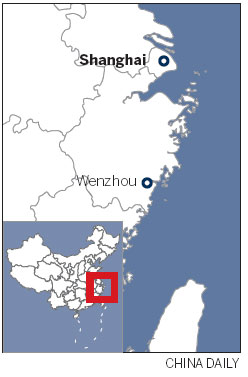Neither a borrower nor a lender be
Updated: 2011-10-17 07:55
By Yu Ran (China Daily)
|
|||||||||
|
Wenzhou, usually renowned for its booming private economy, has seen many of its enterprises trapped in serious cash flow problems that have aroused the attention of the nation's top leadership. Provided to China Daily |
|
The Center Group, a major Wenzhou-based maker of spectacles, has been involved in a default incident as a result of the city's recent corporate cash-flow crunch. Chang Kong / For China Daily |
The collapse of "gray" banking in Wenzhou has hit local businesses
WENZHOU, Zhejiang - Premier Wen Jiabao paid a rare visit to Wenzhou, a typical boomtown in eastern Zhejiang province, during the National Day holidays. He was accompanied by a team of senior treasury officials, including the Finance Minister Xie Xuren and the Governor of the People's Bank of China, Zhou Xiaochuan.
Wenzhou has nothing to offer in terms of amenities, so these luminaries didn't go there to seek temporary relief from the heavy burdens of state. Instead, they traveled to the city to address what has recently become a huge headache for the manufacturing powerhouse.
The high-level visit served as a reminder that a localized credit crisis in Wenzhou is threatening to escalate into a national issue. Similar problems, on a lesser scale, are known to be troubling China's other manufacturing hubs, including cities in the Yangtze River Delta and the Pearl River Delta.
Since Wen's visit, the local and provincial governments have introduced a raft of measures with the intention of containing the crisis. At the core of their efforts is the establishment of a bailout plan, amounting to an estimated 100 billion yuan ($15 billion), to help insolvent entrepreneurs repay high-interest loans taken out with underground lenders.
In recent weeks, the local government has maneuvered behind the scenes to persuade banks and the credit middlemen, called underwriters, to be more sympathetic in their dealings with cash-strapped clients and, if necessary, to provide them with loans at favorable terms.
"We've put together a group of 48 underwriting companies to provide money and corporate services to small and medium-sized enterprises (SMEs) with lower interest rates and commission fees," said Yu Zhongping, director of the Wenzhou Economic and Information Commission.
Yu added that more measures will be introduced to monitor and control the risk of a collapse of the gray, or underground, money market that has become a major source of funding for many SMEs.
The municipal government has also organized teams of officials to work with 25 banks to conduct a thorough study of the nature and extent of the credit crisis that has already driven more than 90 factories out of business. The collapse has resulted in a number of factory owners absconding with whatever money and assets they could haul, leaving behind empty buildings and thousands of unpaid workers. In some extreme cases, the owners have committed suicide.
To help dissuade bankrupt borrowers from absconding or even taking their own lives, the city government has established a team of financial and corporate experts to assist in the restructuring of debts and operations of insolvent enterprises. So far, at least three fugitive entrepreneurs have returned to Wenzhou to cooperate with the government in rebuilding their businesses.
What's more, banks in the city, including the local branches of the State-owned banks, have agreed to extend credit to financially troubled enterprises to help them overcome cash flow problems.
As the major commercial lender based in the city, Bank of Wenzhou Co Ltd has increased its loans ratio in the area to 60 percent from 40 percent to increase the funds available to business.
"If we receive permission from the central bank to increase the debt limit, our bank will definitely implement those new limits in Wenzhou as a priority," said Wu Hua, president of Bank of Wenzhou.
"We are offering tailor-made loans to solve the specific credit problems facing individual enterprises," he added.
Meanwhile, to meet the demand from SMEs, the Wenzhou branch of Bank of Ningbo Co Ltd has also increased the ceiling for the amount available for individual loans, adding 100 million yuan to the previous lending limit.
Meanwhile, other banks are chipping in with offers of credit at favorable terms. "Bank of China will help SMEs by providing lower rates of interest on loans and with preferential measures for those enterprises facing extreme difficulties in cash-flow management," said Tao Lingfu, president of the Wenzhou branch of Bank of China Co Ltd.
Earlier this month, the provincial government also moved to help SMEs by establishing measures to assist potential enterprises with a greater number of loans, and to ensure that fewer companies are shut down because of financial problems.
New measures

"More measures will be carried out in the near future to provide SMEs with more efficient loans and more authorized lending companies and bank branches will be established especially to meet the demand from SMEs," said Yang Xiaoping, director of the Zhejiang branch of the China Banking Regulatory Commission (CBRC).
For SMEs, these rolling measures offer an opportunity for a rapid resolution of their troubles.
"We appreciate the recent visit of Premier Wen, who gave us great support and promised to solve the gray market lending problems of SMEs. That led to a series of measures from local government straight away," said Zhou Dewen, chairman of the Wenzhou SMEs Development Association.
The association has launched an emergency fund of 900 million yuan, most of which was donated by its members, to help private companies in urgent need of cash to sustain operations.
According to statistics provided by the Wenzhou municipal government, the amount of private capital in the city currently exceeds 600 billion yuan, with an annual growth rate of 14 percent over the past five years, including about 110 billion yuan from underground lenders.
Since the beginning of the year, the estimated annual interest rate has been rising, hitting a peak of more than 25 percent in September.
Since April, the increasing number of factory closures and absconding owners has severely affected the multi-billion-yuan gray market in Wenzhou and other cities in Zhejiang province.
More than 20 underground lenders have now closed down, leaving them with a total loss estimated at more than 5 billion yuan at the end of September. Experts have said the losses would have been higher if more of the gray lenders had gone under.
Top lenders and depositors really started to sit up and take notice of the collapse of Wenzhou's huge underground banking system after more than 90 companies closed down and some owners committed suicide.
"He owed about 210 million yuan in bank loans and another 200 million to private lenders by pledging 26 property ownership certificates from relatives and friends worth about 32 million yuan," said Lin Hai, a friend of a Wenzhou shoe manufacturer who committed suicide by leaping from the window of his 22nd floor apartment after failing to repay debts.
Lin said that a small number of shoe manufacturers became involved in underground lending activities after rising domestic inflation and costs forced the industry into a cycle of declining orders and production.
"The rising costs of raw materials and labor, coupled with the appreciation of the yuan and the higher tax burden faced by SMEs, have reduced corporate profits greatly," said Zhou of the Wenzhou SMEs Development Association.
However, the recent moves to improve the local situation have prompted a number of entrepreneurs to return to restructure their companies with the encouragement and support of the local government.
Among the owners who absconded, Hu Fulin, the president of China's largest manufacturer of spectacles, the Wenzhou-based Center Group, was the biggest debtor and also one of the first to return to his hometown.
Hu fled to the United States on Sept 21, leaving up to 2 billion yuan in arrears, including 1.2 billion yuan in high-interest debt from underground banks.
"I came back to receive help from the government. I hope that my company can overcome the current difficulties with support and guidance from the local authorities," said Hu in an interview after his return on Monday.
Another errant executive, Sun Fucai, chairman of the board of Aomi Fluid Equipment Co Ltd, returned to Wenzhou on the same day.
Sun sold off all the equipment in his factory and disappeared on Sept 11, after sending his entire workforce on vacation to a scenic spot on the outskirts of the city. It later emerged that he owed 100 million yuan to official banks and informal moneylenders.
"I don't want to spend the rest of my life in the dark, so I chose to come back. I will be more cautious in maintaining cash flow if I resume operations," said Sun, whose company produced precision sanitation pumps, valves and pipe fittings.
The local government has provided strong support to help Sun's company obtain legitimate loans, protect his assets and get his business back on track.
Compared with the situation facing SMEs in Wenzhou, experts predict that companies located in the Yangtze River and Pearl River deltas will not be affected because they will have taken heed of the events in Wenzhou and gained experience.
"The majority of SMEs in the Pearl River Delta don't participate in private lending activities as frequently as Wenzhou businessmen, so they won't fall into the same traps. They've also learned enough lessons to avoid the risks in the future," said Zhou Qiren, a professor at Peking University's National School of Development, talking about the release of a report on the challenges facing SMEs in the Pearl River Delta.
China Daily
(China Daily 10/17/2011 page13)












